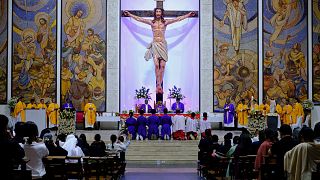with Anadolu
Burundi
Burundi's presidency announced the European Union had lifted its sanctions on Monday after meeting with the EU ambassador to the country.
This move, which comes one year after President Evariste Ndayishimiye's coming to power, will mean the Central African country will no longer be subject to article 96, which suspended financial cooperation between the European Union and Burundi.
The sanctions, which also include the blacklisting of several members of the regime, were imposed in 2016, as citizens protested former president Pierre Nkurunziza's candidacy to a third mandate.
The publication of these sanctions, stirred in turn a wave of protests against the EU.
Despite some rejoicing at the lifting of sanctions, human rights group had warned of the situation in the country, and said dozens of new cases of torture had been documented, since the 2020 elections.













Go to video
EU foreign ministers discuss Ukraine, Syria and EU-African relations in Luxembourg.
Go to video
USA: Screening for "anti-Semitic activities" as grounds for visa refusal
Go to video
DRC: UN report highlights human rights violations linked to M23 group's offensive
Go to video
France: Le Pen declares 'nuclear bomb' dropped after office ban sentencing
Go to video
Burkina: 3 journalists arrested, HRW denounces media repression
Go to video
EU acknowledges Rwanda's role in Congo crisis, but action delayed